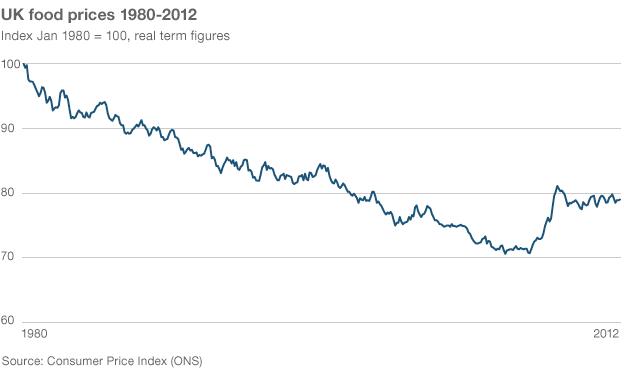Iceland boss blames councils over 'poor meat quality'
- Published
- comments
The chief executive of Iceland, Malcolm Walker, has said he would not eat value branded meat from supermarkets.
Local councils are to blame for driving down food quality with cheap food contracts for schools and hospitals, the boss of Iceland has said.
Speaking on the BBC's Andrew Marr Show, Malcolm Walker said the "problem really lies" with councils buying food from the poorly supplied catering industry.
Retailers should not be blamed for the horsemeat crisis, Mr Walker added.
The Local Government Association said councils were not to blame for what had been "a major supply chain failure".
Mr Walker's comments followed a call on Sunday from the boss of Waitrose for tighter meat testing controls.
Environment Secretary Owen Paterson is to meet representatives from Sainsbury's, Morrisons, Tesco, Asda, the Food and Drink Federation, and the Institute of Grocery Distribution on Monday afternoon.
A Department for Environment, Food and Rural Affairs (Defra) spokeswoman said the meeting would allow Mr Paterson to get an update on testing results and find out more about what businesses are doing to restore consumer confidence.
'Cheap food'
Iceland was among UK retailers, including Tesco, Asda, Lidl and Aldi, which withdrew products found to test positive for horse DNA.
After Iceland removed a line of quarter-pounder beefburgers last month, the north Wales-based firm said it "would be working closely with its suppliers" to ensure its products met "high standards of quality and integrity".
Sir Merrick Cockell, chairman of the LGA: "We always look for a balance between a good price... but also the right products"
Mr Walker told the BBC: "British supermarkets have got a fantastic reputation for food safety, they go to enormous lengths to protect their brand."
He insisted supermarkets were already extremely transparent about food quality and testing.
"If we're going to blame somebody let's start with local authorities, because there's a whole side to this industry which is invisible - that's the catering industry. Schools, hospitals - it's massive business for cheap food and local authorities award contracts based purely on one thing - price," he said.
He added: "Iceland has never sold economy products - we do not sell cheap food... we know where all our food comes from, we follow the supply chain right the way through and it's very short."
Supermarkets were not the real culprits in "driving down food quality", he said.
"Dodgy cutting houses and backstreet manufacturers have been supplying products to the catering industry and a lot of that is bought by local authorities for schools and hospitals - that's where the problem really lies," he added.
Merrick Cockell, chairman of the LGA, said the relationship between a council and a caterer was the same as that between a retailer and a consumer.
"We have a contract with that retailer to provide us with what it says on the wrapper and that is exactly the same with local government providing contracts for school meals or, indeed, the NHS with hospitals.
"Clearly in some cases, relatively few cases, that has not been happening and actually for the boss of Iceland to appear and make that suggestion... well I hope he knows more about what's actually going on in retailing than he clearly does in contracting and local government."
A Local Authorities Caterers Association spokeswoman said it was "disappointed" with Mr Walker's remarks.
"Local authorities across the country have been totally supportive of driving food standards up in schools over the last few years," she told BBC News.
She insisted providers adhered to stringent "procurement policies and procedures for sourcing and ensuring quality control of food products for school menus".
"With monitoring and control tighter than ever before, quality of food served in schools has risen, not fallen," she added.
'Cheap commodity'
Waitrose also withdrew a number of products when the horsemeat scandal came to light.
Although none tested positive for horse DNA, some own-brand meatballs were found to contain traces of pork.
Managing director Mark Price said the John Lewis-owned firm would set up its own freezing plant to prevent cross-contamination.
Speaking to The Sunday Telegraph, external, Mr Price urged the food industry to apply "renewed rigour" to their testing regimes.
He said: "If something good comes of the current scandal, I hope it is the opening up of a debate around the true economics of food.
"The simple fact is that food cannot be seen as a cheap commodity when so many factors are working against that premise, including population growth."
Meanwhile, former Food Standards Agency manager John Young told the Sunday Times he had alerted the government in 2011 to the "debacle" of horse passports, which were supposed to stop the painkiller bute entering the food chain, but was ignored.
A Defra spokesperson responded that Mr Paterson had asked the FSA's chief executive and Defra officials to look into the allegations, insisting it was "clear Defra and the FSA have taken action on the issue... when information has been passed to us".
"In January 2012, Defra and the FSA increased checks on horse passports, meaning every horse was checked twice, and from last week no horse can enter the food chain until it is confirmed to be free of bute," they said.
The FSA said it had submitted a "full file" on its horsemeat investigation to Europol, the EU's law enforcement agency, with information being analysed in 35 countries in Europe and elsewhere.
